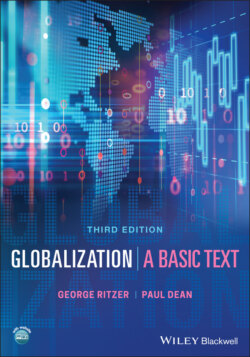Читать книгу Globalization - George Ritzer - Страница 54
GLOBAPHILIA
ОглавлениеA great deal of attention has been devoted, at least until recently, to the economic success attributed to globalization (Kahn 2012). It is clear to supporters that the North has gained disproportionately from globalization. There is a tendency to ignore the “losers” in the process, including not only most of the South, but also those in the North who have not been beneficiaries of these economic gains. While the losers are ignored, they are expected to take solace in the assumption that while they may not yet have gained much, they will soon, if only they are patient. Adopted here is the view that a “rising sea raises all boats” and eventually most, if not all, will be beneficiaries of globalization’s economic advances.
Another positive view associated with globaphilia is that globalization will bring with it increasing democratization. There is an assumption that economic progress leads to democracy and/or democracy leads to economic progress (Friedman 2002). In addition, there is the view that democracy itself is being spread by globalization, despite the fact that globalization has brought both democracy and authoritarian regimes (Moghadam 2013). There are various other positive outlooks associated with globaphilia including the idea that globalization is furthering the spread of “civil society” (Kellogg 2012). Civil society (see Chapter 5) involves those organizations and institutions that are separable from the nation-state and the market and that are able to represent some alternative, if not opposition, to them and their hegemony. The spread of democracy throughout the world is seen as furthering civil society in those countries that move in that direction. After all, the ability of civil society to stand up to the power of the state and the market serves to reduce authoritarianism and to foster democratization. Furthermore, globalization is seen as bringing with it global organizations, especially INGOs like Greenpeace and the World Wildlife Federation, that are themselves part of global civil society. Characteristically, what globaphiliacs ignore is the ways in which globalization can adversely affect civil society through the power of some global INGOs (e.g. World Economic Forum) as well as through global processes such as the market, the emergence and spread of authoritarian regimes, nationalist populism, and military incursions. All of these can short circuit, and even destroy, democratic civil society.
